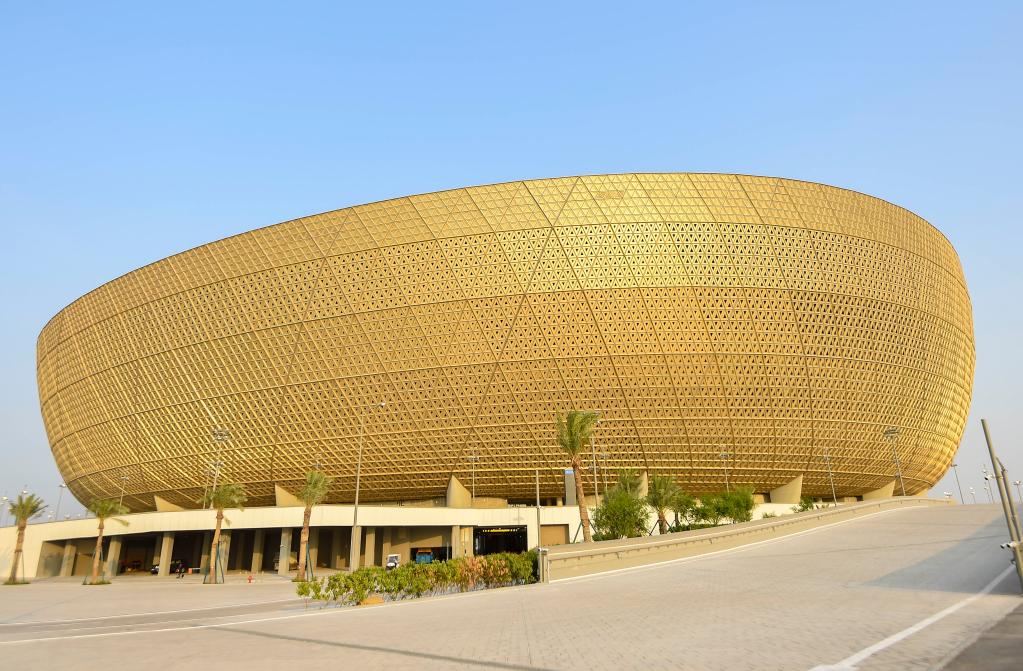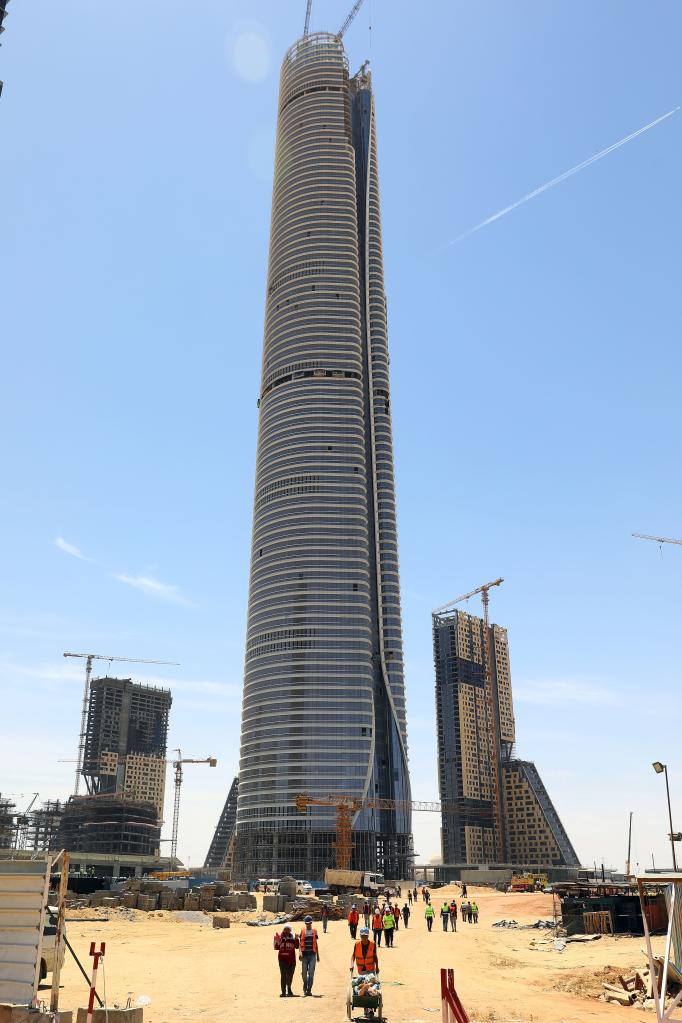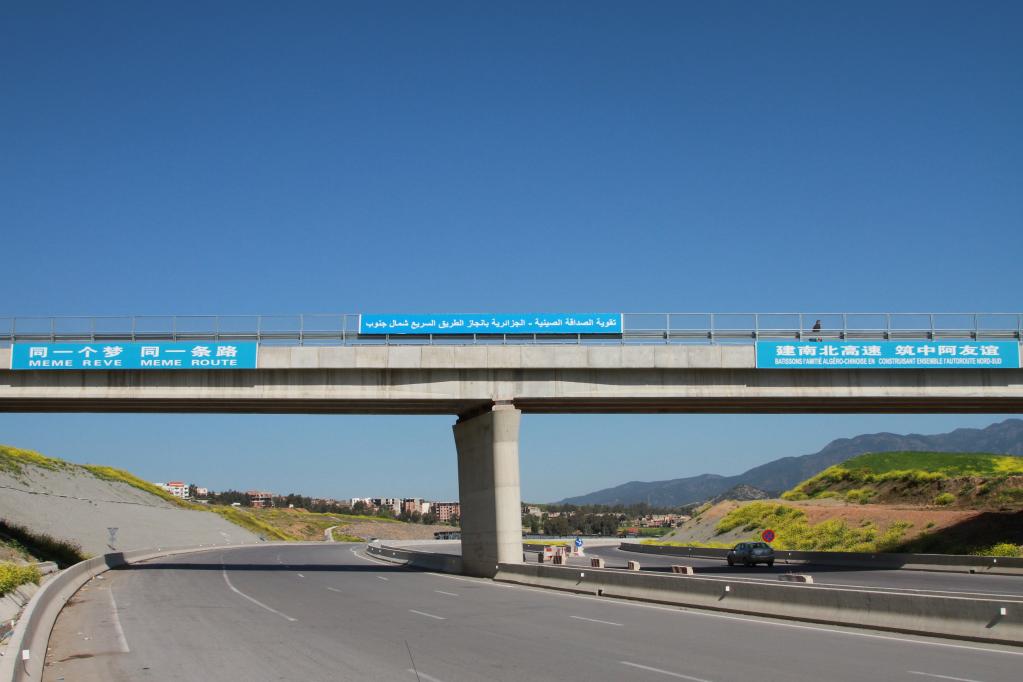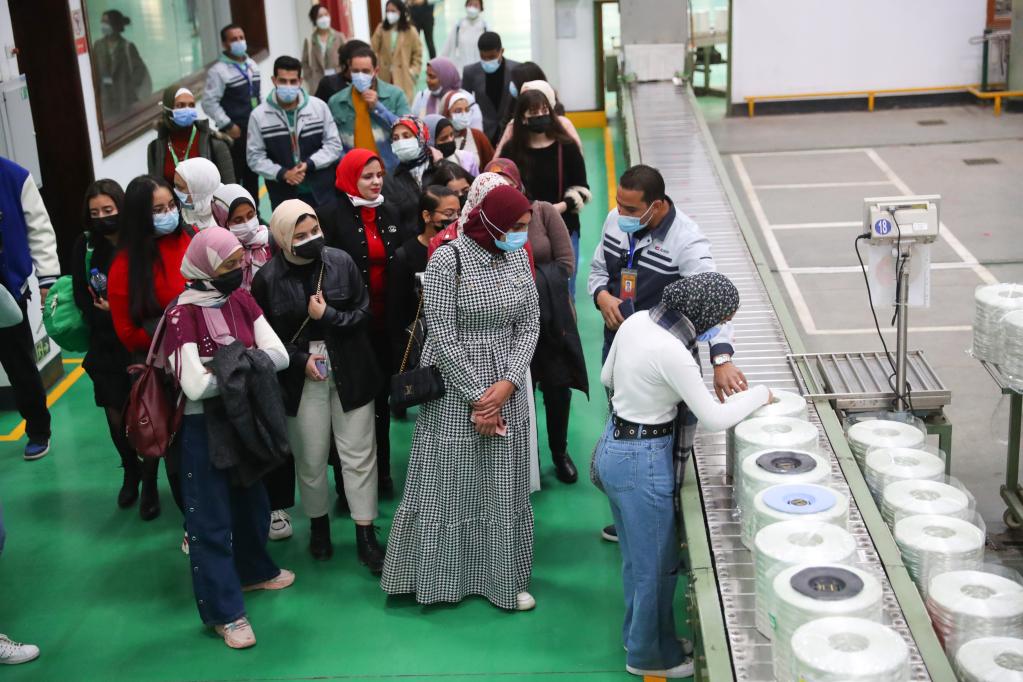
This photo taken on Aug. 11, 2022 shows the exterior view of Lusail Stadium, the main venue for the 2022 FIFA World Cup in Doha, Qatar. (Photo by Nikku/Xinhua)
- China has signed Belt and Road cooperation documents with 20 Arab countries and the Arab League, said a report on the China-Arab cooperation in the new era issued by the Chinese Foreign Ministry earlier this month.
- As important participants along the ancient Silk Road trade routes, the Arab states are China's natural partners in the Belt and Road cooperation, said the report.
CAIRO, Dec. 8 (Xinhua) -- From the gleaming Lusail Stadium in Qatar, an 80,000-seat venue for the World Cup, to the Mohammed VI Bridge in Morocco, and the Great Mosque of Algiers, the Belt and Road cooperation between China and Arab countries has been in full swing since the initiative was proposed in 2013.
Standing on a new starting point, the two sides are expected to take the first China-Arab States Summit as an opportunity to promote the building of a China-Arab community with a shared future in the new era with increasing Belt and Road cooperation.
EXEMPLAR SOUTH-SOUTH COOPERATION
China has signed Belt and Road cooperation documents with 20 Arab countries and the Arab League, said a report on the China-Arab cooperation in the new era issued by the Chinese Foreign Ministry earlier this month.
As important participants along the ancient Silk Road trade routes, the Arab states are China's natural partners in the Belt and Road cooperation, said the report.

Photo taken on May 20, 2022 shows the Iconic Tower, the tallest building in Africa, in the central business district (CBD) of Egypt's new administrative captial. (Xinhua/Ahmed Gomaa)
When the silhouette of the tallest building in Africa pierced the clouds 50 km east of the Egyptian capital of Cairo after sunrise, Yan Yueping, a 26-year-old security engineer of China State Construction Engineering Corporation (CSCEC) finished a routine morning meeting, and started his daily security inspections.
The 385.8-meter-high Iconic Tower, under construction by the Chinese group since 2018, is one of 20 eye-catching skyscrapers as part of the CBD project in Cairo.
During the construction of the Iconic Tower's raft foundation, which is the largest of a single building in the Middle East and Africa, the project team adopted the Chinese technology of "CHUTE" to guarantee construction security and efficiency.
Waleed Ramadan, an Egyptian engineer working with CSCEC in the construction of the Iconic Tower, is one of those who gained expertise during the mega project.
"Building such a giant project is a new experience in Egypt ... China is transferring this experience to Egypt," Ramadan told Xinhua at the construction site.
Under the contract signed between CSCEC and the Egyptian housing ministry for the construction of Egypt's new administrative capital, the CBD project covers an area of 505,000 square meters.
This project is among the numerous Belt and Road cooperation projects across the Arab world. Official data showed that the two sides have implemented more than 200 large-scale cooperation projects in various fields including energy and infrastructure. Such cooperation has benefited nearly 2 billion people.
FOR PEOPLE'S BETTER LIFE
The close Belt and Road cooperation between China and Arab countries has not only vitalized the traditional bilateral friendship, but also greatly improved people's life in the region.

Photo taken on April 19, 2018 shows cars moving on the North-South Highway in Benchicao, Algeria. (Xinhua)
About one hour's drive south of Algiers, the capital of Algeria, a Chinese-French bilingual signboard with the words "One Road, One Dream" on the Atlas Mountains is particularly conspicuous, welcoming people to a 53-km-long project, the Chiffa section of Algeria North-South Highway undertaken by CSCEC.
"I am able to pass through the route several more times a day, and my income is much higher," Madjid Bahout, an Algerian taxi driver, told Xinhua, noting that before the Chiffa section of the highway opened to traffic in late 2020, it would take him one and a half hours and even three hours in winter to drive from the northern city of Blida to Medea, a town in the north-central part of the country, while now the time is shortened to only half an hour.
The project has effectively facilitated social and economic development, saved transportation costs, and improved travel convenience for the locals, said Mohamed Khaldi, director general of Algeria's National Highway Agency.
To build the Chiffa section, CSCEC has created more than 10,000 jobs in Algeria and trained over 2,000 professionals in the construction sector, according to figures released by the company.
In fact, the Belt and Road cooperation between China and Arab countries goes far beyond massive infrastructure projects. A number of clean energy projects have helped some Arab countries secure energy supplies by diversifying the energy mix.
In the United Arab Emirates (UAE), China's Harbin Electric International cooperates with Saudi Arabia's ACWA Power in a joint venture to build the Hassyan Clean Coal project in Dubai. The power plant, expected to be fully put into commercial operation in 2023, will greatly lower the cost of electricity for local households.
During the COVID-19 pandemic, China and the Arab world have carried out close vaccine cooperation. In Egypt, Algeria and the UAE, China has helped localize vaccine production to meet the rising demand, a concrete step to safeguard people's health and build a community of health for all.
A BRIGHTER FUTURE
As an old Chinese proverb goes, "Give a man a fish and you feed him for a day; teach a man to fish and you feed him for a lifetime." During the Belt and Road cooperation, the Chinese side has paid special attention to technology and management experience sharing, which bears great significance to the sustained development of the local economy.

Egyptian students visit the factory of China's fiberglass manufacturer Jushi Egypt, located in China-Egypt TEDA Suez Economic and Trade Cooperation Zone, Egypt, on Dec. 30, 2021. (Xinhua/Sui Xiankai)
In Egypt's Suez Canal Economic Zone (SCZone), Egyptian employees in China's industrial developer Tianjin Economic-Technological Development Area (TEDA) Cooperation Zone have reached over 90 percent, including a group of professional technical and management staff.
TEDA has attracted many enterprises to SCZone, including China's fiberglass giant Jushi, which has helped Egypt become one of the largest fiberglass producers and exporters in the world over the past years.
In addition, according to a plan put forward by China International Development Cooperation Agency, a training center in the zone is set to be built to cultivate more local technicians.
Deepened cooperation has also enhanced mutual understanding between the Chinese and the locals. "My Chinese colleagues and I are not only colleagues but also family and friends," said Mohammad Saeed, a Bahraini employee with China Machinery Engineering Corporation.
Looking into the future, experts have voiced confidence that China and Arab countries will bring their Belt and Road cooperation to a higher level, and jointly create a brighter future.
As Samer Khair Ahmed, a Jordanian writer and expert on Arab-China relations, once said, the Belt and Road holds great potential for boosting Arab-China cooperation and mutual learning, bringing more benefits to the people of both sides.
"In my opinion, the closer the Arabs cooperate with China, the closer they will achieve their own revival and rejuvenation," said the expert.
